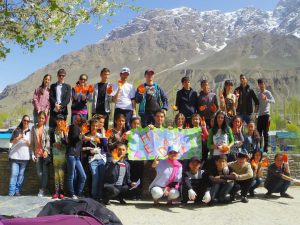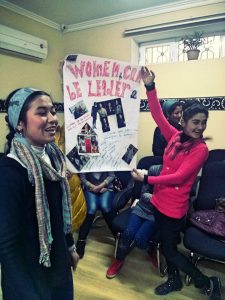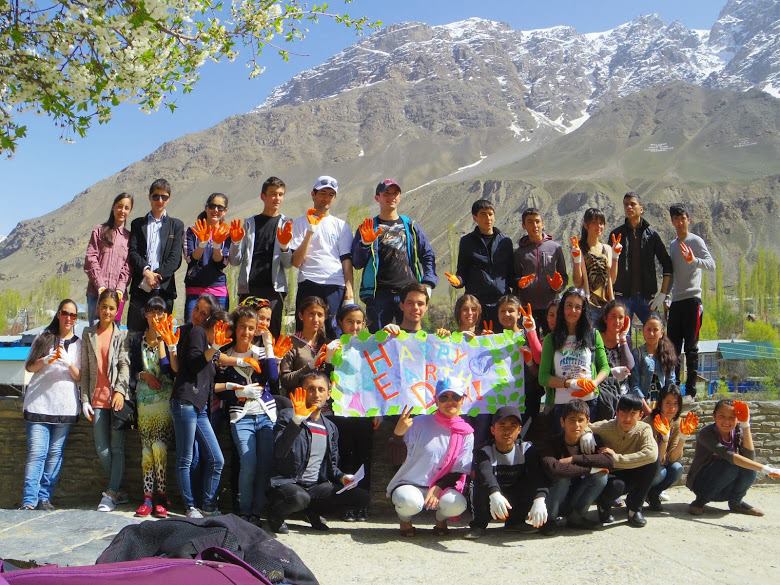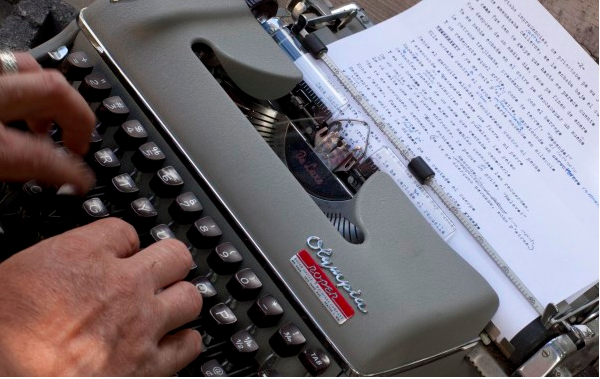
Chane Corp, 2014-2015, Fulbright English Teaching Assistant to Tajikistan, celebrating World Earth Day by volunteering in Khorog City Park with students from various students from different American Corners’ clubs.
As a member of the LGBTQ+ community, I knew there would be stigma surrounding this group in Tajikistan. While on my 10-month grant, I wanted nothing more than to be a personal advocate for tolerance; however, while studying and teaching in Kyrgyzstan, I developed an appreciation for keeping this personal information private. At various times, I have been told that this sort of discretion is not being true to who I am – but I disagree. Immersing yourself in another culture necessitates a sincere respect for local norms and opinions; being a successful cultural ambassador means finding the common ground that will allow you to be a productive, valued, member of your host community. Being a Fulbright grantee means you represent more than your own opinion; it means you are larger than your own passions.
When discussing sensitive issues abroad, my focus was always on the singular issue of tolerance. I sought to have difficult conversations with my students – ones that challenged not only their views, but also my own. When the racially charged unrest in Ferguson, Missouri hit its peak in November, 2014, the Russian news media (which is by far better funded and more chic than local Tajik outlets) devoted significant resources to covering the tension. Every night, nightly news would show dramatic footage of rioting and more than a few of my students genuinely believed that America, as a country, was on the verge of collapse. As dramatized as the Russian version of events were, this depiction offered a valuable opportunity for a frank and honest discussion about social issues in America and, indeed, around the world.
Lecturing was – and still is – my greatest fear. Far too often, I would want to start a conversation with “In America…” or “Well we believe…” Ferguson gave me the opportunity to embrace the imperfection of my own country and to show Tajiks that while America is land of splendid diversity, widespread tolerance, and unbounded opportunity, it also is constantly struggling to fully live up to its own ideals. These conversations contextualized both American and Tajik social issues within the wider framework of the global human rights movement. Is the United States a model for other countries? Certainly, but, at the same time, Ferguson helped both my students and me understand that the path towards global equality is one we walk towards together.

One the livelier debates with my students: Can Women be Leaders?
I could have lobbied for singular issues that I’m passionate about and pushed my students to agree that LGBTQ+ individuals have an inherent right to be respected. If I had done so, I would not have remained an effective influence on the majority of my pupils. There was – and likely will always be – a temptation to stand on top of the soapbox about a variety of issues while on a Fulbright grant. Did it hurt when my students insulted gay people? Of course, however, I had more important goals than protecting my own pride. Focusing on a wide-range of social and cultural challenges allowed me to promote diversity and have genuine conversations about challenges that Tajikistan and the United States face. Tajikistan is changing. With each generation, a more tolerant society will emerge. I like to think that my former students will be leading the charge.
Advice to Fulbright U.S. Student Program applicants: As you prepare your application, reflect on how you will embrace your local community. There is no such thing as a “cookie-cutter” Fulbright. Each country and overseas Fulbright office will challenge you in ways that are unimaginably fulfilling. Be flexible. Be open. Think about how you will represent the best of America, not just your own experiences, but our shared identity and national ideals. Enter into your host country certain of who you are and confident in your values, but be ready to embrace the history and culture that has shaped the community you serve. Choose a path that leaves you uneasy, one that makes you wonder at night: “What am I doing?”
Most importantly, know that each moment that pushes you is worth it. You will be showered with love—often in the form of food— and leave an indelible mark on your host community. Be unforgettable for the good reasons: listen, learn, and explore. Ten months will pass in a blink of an eye, and you will almost certainly leave changed for the better.



1 Comment
Hi! I would address you with a salutation with your name but it would appear that there is no author’s name included. Any how, my name is Miguel Guevara and I am currently applying to the ETA Fulbright Grant in Tajikistan from the US. It seems like you had quite the experience in the classroom teaching English to Tajik students. I wanted to ask you, what were some of your greater challenges in teaching English to Tajiks (especially if you have little knowledge of Russian or Tajik)? Specifically, what did you think were the most effective methods to teach English? Was it literature, film, music, writing, sport (extra-curriculurs)? I have had the thought of using film and writing (especially that of Firdowsi’s Shahnameh to teach English, but I off the top of my head I can think of quite a few challenges, first and foremost being the usage of the Cyrillic alphabet. I would love to hear more of your personal experiences as I continue my application. I will include my email here as well in the email reponse box. Would love to hear more testimonies!